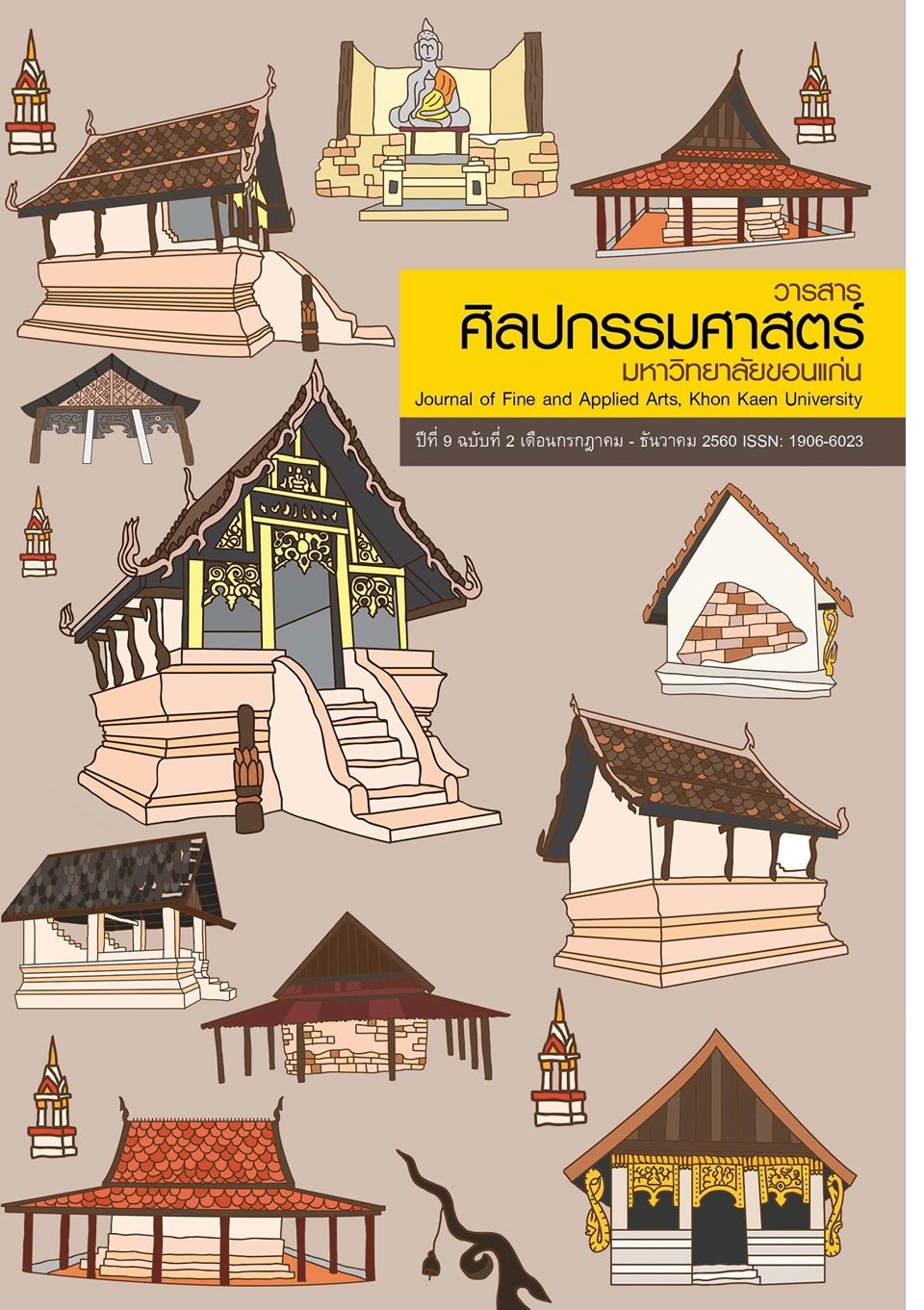มโหรีอีสาน : การพัฒนาเพื่อสืบสานคุณค่าทางวัฒนธรรม Mahoree E-san orchestra : the development for cultural values conservation
Main Article Content
Abstract
วงมโหรีอีสาน เป็นวงดนตรีพื้นบ้านในอีสานชนิดหนึ่ง ซึ่งรับอิทธิพลทางวัฒนธรรมจาก 2 กลุ่มวัฒนธรรม ได้แก่ กลุ่มวัฒนธรรมลาว-เขมร ในบริเวณภาคอีสานตอนใต้ และกลุ่มวัฒนธรรมภาคกลางของไทย โดยผ่านพื้นที่รอยต่อทางวัฒนธรรม ทำให้เกิดรูปแบบวงดนตรีที่มีเอกลักษณ์เฉพาะตัว ปัจจุบันวงมโหรีอีสานกำลังประสบปัญหาหลายด้าน งานวิจัยนี้กำหนดความมุ่งหมายเพื่อศึกษา 1) ศึกษาประวัติความเป็นมาวงมโหรีอีสาน 2) ศึกษาสภาพปัจจุบันและปัญหาของวงมโหรีอีสาน 3) ศึกษาแนวทางการพัฒนาวงมโหรีอีสานเพื่อสืบสานคุณค่าทางวัฒนธรรม เก็บรวบรวมข้อมูลจากเอกสาร ข้อมูลภาคสนามในจังหวัดร้อยเอ็ดและจังหวัดมหาสารคาม ด้วยวิธีสำรวจ สังเกต สัมภาษณ์และสนทนากลุ่ม นำข้อมูลที่ได้มาวิเคราะห์ตามความมุ่งหมายของการวิจัย นำเสนอผลการวิจัยโดยการพรรณนาวิเคราะห์ ผลการวิจัยปรากฏดังนี้ 1) ด้านประวัติและความเป็นมาของวงมโหรีอีสาน พบว่า วงมโหรีอีสานใช้ในประเพณีพิธีกรรมท้องถิ่น ได้รับการถ่ายทอดมาจากกลุ่มคนในจังหวัดนครราชสีมา เดินทางเข้ามารับจ้างสอนเล่นมโหรีอีสานในพื้นที่ และได้รับอิทธิพลด้านบทเพลงจากวัฒนธรรมเขมรและเพลงไทยเดิม 2) ด้านสภาพปัจจุบันและปัญหาของวงมโหรีอีสาน พบว่า มีบางประเพณีที่นำมโหรีมาบรรเลง ชาวบ้านนิยมในการแสดงพื้นบ้านชนิดอื่นแทน ส่งผลให้จำนวนวงมโหรีอีสานลดน้อยลงตามลำดับ 3) แนวทางการพัฒนาวงมโหรีอีสานเพื่อสืบสานคุณค่าทางวัฒนธรรม วงมโหรีอีสานควรมีการปรับตัวตามสภาพสังคม ดังนี้ การสร้างสรรค์บทเพลงเพิ่มเติม นำเทคโนโลยีเครื่องเสียงเข้ามาใช้ ควรมีการฟ้อนรำประกอบ การจัดการวงอย่างเป็นระบบ การประชาสัมพันธ์ และการสนับสนุนจากภาครัฐอันเป็นส่วนสำคัญที่จะทำให้วงมโหรีอีสานได้กลับมามีชีวิตอีกครั้งหนึ่ง
Mahoree E - san orchestra is a type of music performances influenced by Khmer - E - san culture in north-east region and Khmer culture in central region of Thailand where are the local boundaries of Khmer culture.At present,many groups of Mahoree E- san orchestra are encountering with many problems.The objectives of this research are these:1) to study the background of Mahoree E - san orchestra groups,2)to study current situations and difficulties of Mahoree E - san orchestra groups,and3)to study the ways to develop Mahoree E - san orchestra groups in order to perpetuate cultural value of this performance.Research data were collected through documentary and field studies in Roi Et Province and Maha Sarakham Province.The methods used for collecting data were a survey,an observation,an interview,and a focus group.The data were analysed according to research objectives and research resuls were presented by means of a descriptive analysis.The research results have indicated as follows:1)the background of Mahoree E -san orchestra groups originated from the performances in traditional events,this performance is inherited from musicians from Nakhon Ratchasima Province who transmitted the ways to perform it to people in the research areas,and its music accompaniments are influenced by Khmer culture,2)current situatons and difficulties are a lack of opportunity for an Mahoree E - san orchestra to be performed in a tradition event,other performances have more efficient than Mahoree E - san orchestra performance for responding requirements of the audience so the groups of Mahoree E - san orchestra are being reduced,and 3)the ways to develop Mahoree E - san orchestra groups in order to perpetuate cultural value of this performance indicated that they should adapt themselves to a social change;for example,each group should create more new music accompaniments,new audio techniques should be used,local dancing movements should be created for this performnce,and systematic management should be used for this performance.Public relations and the support of state sector are necessary for encouraging the revival of Mahoree E - san orchestra performance.
Article Details
Content and information in articles published in the Journal of Fine and Applied Arts of Khon Kaen University is regarded as the opinion and sole responsibility of the author(s) directly; therefore, editors are not obliged to agree to or share any responsibility with regard to the content and information that appears within these articles.
All articles, information, content, image, etc. that have been published in the Journal of Fine and Applied Arts of Khon Kaen University is the copyright of the Journal of Fine and Appllied Arts of Khon Kaen University. Any person or organization who wishes to distribute all or parts of the articles for further dissemination or other usage must first receive permission from the Journal of Fine and Applied Arts of Khon Kaen University before proceeding to do so.

